In This Section
- Home
- Collections
- Atlas Resources for Schools
- Cork Fatality Register
- Mapping the Irish Revolution
- Mapping IRA Companies, July 1921-July 1922
- Mapping the Burning of Cork, 11-12 December 1920
- Martial Law, December 1920
- The IRA at War
- The Railway Workers’ Munitions Strike of 1920
- The Victory of Sinn Féin: The 1920 Local Elections
- The War of Words: Propaganda and Moral Force
- The IRA Offensive against the RIC, 1920
- De Valera’s American Tour, 1919-1920
- The British Reprisal Strategy and its Impact
- Cumann na mBan and the War of Independence
- The War Escalates, November 1920
- The War of Independence in Cork and Kerry
- The Story of 1916
- A 1916 Diary
- January 9-15 1916
- January 10-16, 1916
- January 17-23, 1916
- January 24-30, 1916
- February 1-6 1916
- February 7-14, 1916
- February 15-21, 1916
- February 22-27, 1916
- February 28-March 3, 1916
- March 6-13,1916
- March 14-20, 1916
- March 21-27 1916
- April 3-9, 1916
- April 10-16, 1916
- April 17-21,1916
- May 22-28 1916
- May 29-June 4 1916
- June 12-18 1916
- June 19-25 1916
- June 26-July 2 1916
- July 3-9 1916
- July 11-16 1916
- July 17-22 1916
- July 24-30 1916
- July 31- August 7,1916
- August 7-13 1916
- August 15-21 1916
- August 22-29 1916
- August 29-September 5 1916
- September 5-11, 1916
- September 12-18, 1916
- September 19-25, 1916
- September 26-October 2, 1916
- October 3-9, 1916
- October 10-16, 1916
- October 17-23, 1916
- October 24-31, 1916
- November 1-16, 1916
- November 7-13, 1916
- November 14-20, 1916
- November 21-27-1916
- November 28-December 4, 1916
- December 5-11, 1916
- December 12-19, 1916
- December 19-25, 1916
- December 26-January 3, 1916
- Cork's Historic Newspapers
- Feature Articles
- News and Events
- UCC's Civil War Centenary Programme
- Irish Civil War National Conference 15-18 June 2022
- Irish Civil War Fatalities Project
- Research Findings
- Explore the Fatalities Map
- Civil War Fatalities in Dublin
- Civil War Fatalities in Limerick
- Civil War Fatalities in Kerry
- Civil War Fatalities in Clare
- Civil War Fatalities in Cork
- Civil War Fatalities in the Northern Ireland
- Civil War Fatalities in Sligo
- Civil War Fatalities in Donegal
- Civil War Fatalities in Wexford
- Civil War Fatalities in Mayo
- Civil War Fatalities in Tipperary
- Military Archives National Army Fatalities Roll, 1922 – 1923
- Fatalities Index
- About the Project (home)
- The Irish Revolution (Main site)
When Tomás MacCurtain was elected Lord Mayor of Cork
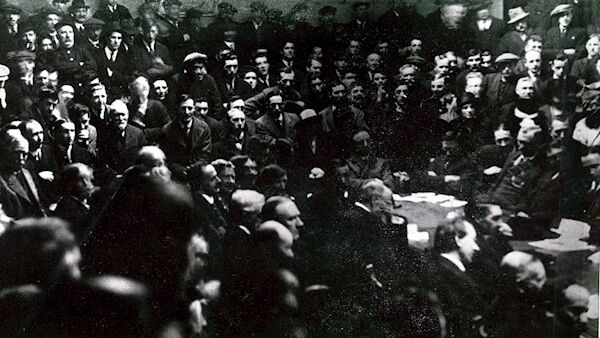
In this year of significant commemorations, of UCC’s Centre for Local and Regional Governance recalls the Cork Corporation elections of January 15, 1920, and the first meeting of the Corporation on January 30, at which the doomed Sinn Féin man became the city’s first citizen
Ahead of the local municipal elections for Cork Corporation on January 15, 1920, the Cork Examiner (2 January) noted that interest in the elections was gathering pace but, “with so many varied parties involved, it will be difficult to forecast anything like an approximate result, a difficulty that will be greatly increased by the introduction of the P.R. (proportional representation) system”.
When nominations closed three days later, 165 candidates were in place to contest for the 56 seats on the Corporation, across seven electoral wards. As election day approached, one very prominent figure in the city was Lord Mayor, Alderman William F O’Connor, who was nominated in three separate electoral wards.
Playing the publicity game to perfection, the Lord Mayor, representing the Irish Nationalist Party, hosted a fete for 2,000 boys from disadvantaged backgrounds in City Hall on Wednesday, January 7.
The use of proportional representation by the single transferable vote as the electoral mechanism caused some consternation in the build-up to polling day. The Cork Examiner printed ‘An elector’s Catechism’, supplied by the Proportional Representation Society of Ireland.
With regard to marking preferences down theballot paper, it explained: “Under proportional representation a candidate is often able to secure victory at the very last moment.
He may creep up on the fourth, fifth, or later counts and, although very low down on the poll after the early counts, he may find himself victorious before the close.”
On the day of the elections, Thursday, January 15, the Cork Examiner referred to the fact that proportional representation had “tempted many parties and interests that under old conditions would have little hope of gaining representation on the council, to put forward candidates”.
The newspaper expressed the wish that ‘the voters will return 56 public spirited and intelligent men, representing the best in all parties, that will not only not neglect the interests of the city, but will promote and encourage commercial enterprise.’
Another article reported that six men had attacked the Lord Mayor,Alderman William F O’Connor, on Washington Street the previous night after addressing a meeting of theDischarged and Demobilised Sailors and Soldiers’ Federation.
Turnout for the elections was reported as “about two-thirds, including many women”. Generally, good order prevailed but an exception wasGrattan Street “where bodies of Sinn Féiners from the country, and ex-soldiers came into rather fierce conflict.
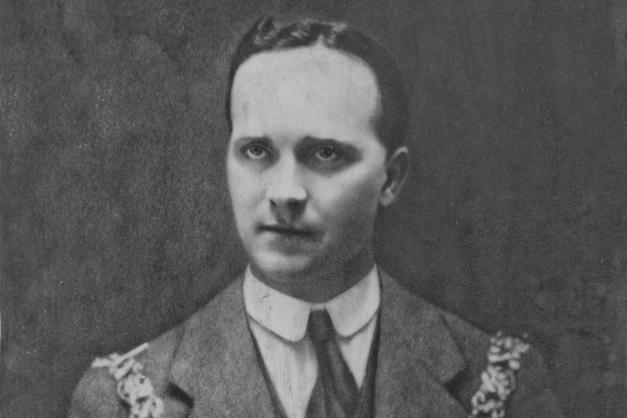
Revolvers and knives were used and three men were treated in the Mercy Hospital in the late afternoon, one with a bullet wound in the arm” (Cork Examiner, January 16, 1920).
Counting of votes commenced in City Hall at 9.30am on January 16.
For the next two days, the Cork Examiner covered the count in enormous detail, marvelling in the intricacies of the process, as overseen by Town Clerk, Florence W McCarthy:
‘The system of election under the Proportional Representation Act brings its most drastic change from the old method. It is a most elaborate procedure. In all areas the votes have to be scrutinised to see if they are in order and correct. Only such papers go into the count, and when the total has been ascertained it is divided by the number of vacancies plus one, and to the quotient is added one. In this way, the quota is arrived at” (Cork Examiner, January 17 1920).
Police presence was high in City Hall and only the candidates and their agents were allowed to enter the building.
By early afternoon, large crowds had gathered outside the municipal headquarters and the first result declared by the Town Clerk, in his role as Chief Returning Officer, was for the Shandon Area (North West No. 2).
With six vacancies and a total valid poll of 1,747, the quota was 250.
Sinn Féin’s Edmond Coughlan and Patrick Higgins, both exceeded the quota on the first count and were deemed elected as Aldermen. At the conclusion of the count, the City Coroner, John J Horgan, delivered a speech in which he praised the work of Town Clerk, Florence W McCarthy, and all of the Corporation staff.
Coroner Horgan said: ‘There have been many gloomy prophecies as to when the results of the election would be available. We were told that we would not be able to do the work at all properly, that Belfast and similar places would wipe us out.
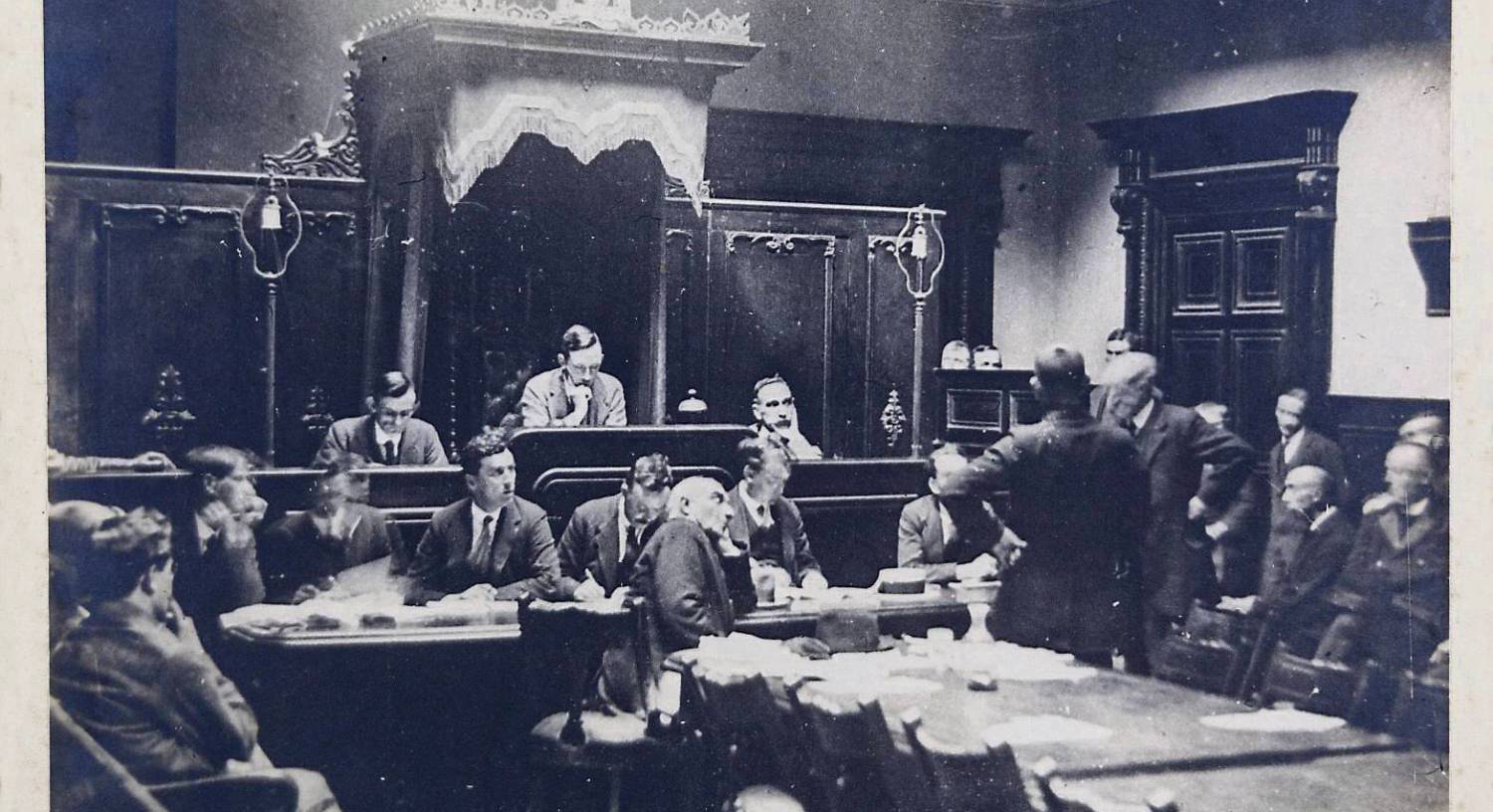
It was also said that the count would take weeks — that it would be next Christmas before the results were available.
“The work has been completed in two days, and Belfast, which had only five areas to deal with against our seven, and where they had five staffs to our two, took one and-a-half days to complete its work. We in Cork have established the record for all Ireland.”
The Town Clerk was then lifted in the air and treated to a rousing rendition of ‘He’s a jolly good fellow’. The elections in Cork city were a success for Sinn Féin and the Transport Workers who ran on a combined ticket.
In total, they claimed 30 out of the 56 seats available. The outgoing Lord Mayor, William F O’Connor, was elected in three different electoral areas.
While this was a triumph for him, he could only accept a seat inone of the areas, meaning that two by-elections would be needed.
As mentioned, Sinn Féin and the Transport Workers joined forces in the election and their combined 30 seats gave them a working majority in City Hall.
They also boasted 11 of theCorporation’s 14 new Aldermen (two in each ward), the exceptions being James Daly (Irish Nationalist),Richard Beamish (Commercial)and Sir Edward Fitzgerald (Irish Nationalist).
In a Cork Examiner editorial onJanuary 20, an optimistic tone was struck about the make-up of the new Corporation: “In a word, it may be said that the new Corporation, irrespective of party or other classification, will take a broad outlook and serve the city’s interests by helping to make the most of their opportunities in contributing to its commercial and industrial upliftment.
It has been said that there is a tide in the affairs of men which, if taken at the flood, leads on to fortune. Cork now stands on the edge of opportunities which, if wisely handled, should bring prosperity to the city and provide an abundance of employment for all classes.
Upon her public representatives much depends. If they be wise, tolerant, progressive and broad-minded, the outlook is full of promise.”
Attention soon turned to the statutory meeting of the new Corporation at which a Lord Mayor would be elected. This was scheduled for Friday 30 January, a week later than normal.
Half an hour before the start of the meeting, the public galleries were virtually full. By midday, the galleries were completely packed and there was a danger of overcrowding as more and more people tried to make their way into the chamber.
The Cork Examiner noted that there some clergymen present and “perhaps for the first time in the history of this meeting, a large number of ladies were present”.
When the outgoing Lord Mayor, William F O’Connor, took the chair he was greeted by a combination of cheers and hissing from the galleries.
Town Clerk, Florence W McCarthy called the roll and this established that 51 members out of the 56 elected were present(effectively, the total was 54 due to William F O’Connor winning seats in three separate wards).
The Sinn Féin councillors answered the roll call in Irish and, when the name of Alderman Frederick Murray was called, his party colleague, Cllr Michael O’Cuill, answered in Irish to the effect that Murray was in prison, “under the lock of the foreigner”.
A similar situation occurred when the name of Alderman J.J. Walsh was called — it was explained that he was “on the run from the foreigner”. Chairman of the meeting, William FO’Connor, then called for nominations for the office of Lord Mayor.
Again, it was Cllr Michael O’Cuill who spoke and, in Irish, he proposed Alderman Tomás MacCurtain, who had topped the poll in Blackpool.
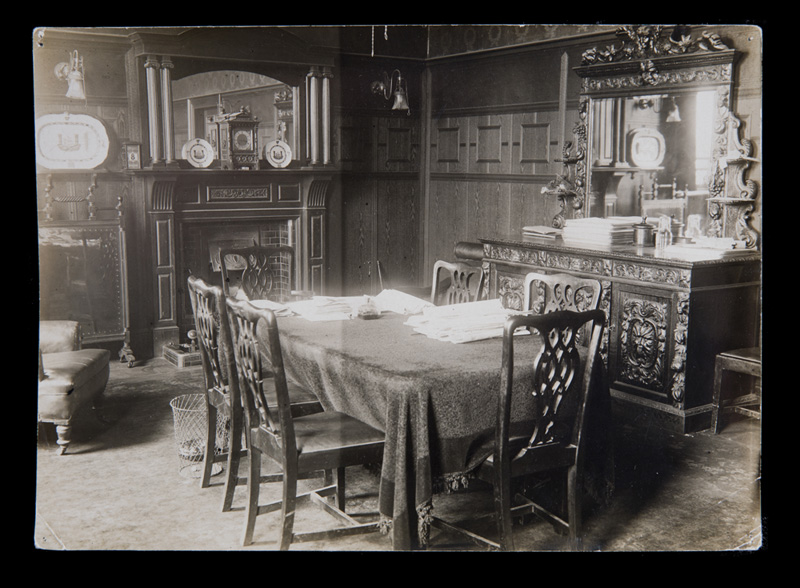
The proposal was seconded by Cllr Terence MacSwiney. The chairman asked if there were any other candidates, at which point Sir John Scott (Commercial) unexpectedly rose to speak.
With no reference to the mayoralty election, Scott commenced a rambling speech about the necessity of a housing scheme. He was ruled out of the order by the chairman but continued to stand.
This led to Alderman Richard Beamish quipping, “He is going to be in order again if you don’t be careful. You can’t suppress that gentleman.”
As the chairman tried to get order, Scott sat down, only to immediately stand up again to propose Beamish as Lord Mayor.
An indignant Beamish retorted that he was not allowing his name to go forward and that Scott had no permission to nominate him.
Labour’s Cllr Michael Egan interjected and, somewhat threateningly, declared, “If Sir John is going to pursue these tactics for the next 12 months, he had better look out forhimself.” Keen to get a grip on the meeting, William F O’Connor declared that, with no other candidate, Alderman Tomás MacCurtain was the Lord Mayor of Cork for the coming 12 months.
Amidst scenes of great excitement, MacCurtain made his way to the Lord Mayor’s dais at the top of the council chamber: “Most of those in the chamber rose and cheered him, the men waving their hats and caps, and the women handkerchiefs.
‘The Soldier’s Song’ was called for, and others shouted ‘Up Blackpool’ and as the newly-elected Lord Mayor signed the declaration accepting the office, ‘The Soldier’s Song’ was sung” (Cork Examiner, January 31).
The outgoing Lord Mayor, William . O’Connor, congratulated MacCurtain on his election and wished him aprosperous year in office.
He then presented MacCurtain with the mayoral chain, amidst “a renewal of lusty cheering”. The new Lord Mayor then delivered a short but business-like speech. He thanked William F O’Connor for his generous remarks and his fellow councillors for unanimously electing him as Lord Mayor of Cork.
MacCurtain noted with regret that he did not possess the oratory skills of Sir John Scott but he wanted to take the opportunity to thank the people of his ward who voted for him in large numbers.
He declared that his main duty would be to stick to the principles of the Irish Republic and to promote the freedom of the country.
In Cork, there were certain issues in relation to the Corporation in the past that it would be well to forget but there were other things it would be well to emulate.
The new Lord Mayor then challenged his fellow elected members to put the interests of their communities before anything else.

He said that all of them would have to put forward their best efforts to improve and advance the citizens’ prosperity, adding, “The people do not want speeches. They want the work done and with as little ‘froth’ as possible.
In doing our work, the people expect from us a sacrifice of time and a sacrifice, perhaps, ofpersonal interest.”
The motto for the year ahead would be self-reliance, efficiency and economy. The Lord Mayor concluded his acceptance speech by highlighting an issue that was very dear to his own heart — the Irish language.
He was delighted to hear it used during the meeting and he hoped that future meetings of the Corporation would preserve abi-lingual attitude.
In time, it was his wish that Cork Corporation would completely conduct its business in the language of the country.
The next business of the meeting was to fix the Lord Mayor’s salary for the year ahead. Cllr Michael Joseph O’Riordan proposed a salary of £1,000 and his motion was seconded by Cllr Daniel Gamble. Both councillors were members of the Irish Nationalist Party.
In response, Lord Mayor MacCurtain told the meeting: “Personally, I don’t think I will take the motion because I don’t think we should start off the new era with that salary.”
His Sinn Féin colleague, Professor Alfred O’Rahilly, recommended asalary of £500, remarking, “We in Sinn Féin are often charged with beingimpractical idealists, but that does not prevent us from being practical administrators. We consider that £500 is a sufficient salary, considering theconditions and difficulties with which we are confronted.”
Lord Mayor MacCurtain called on this recommendation to be agreed and, accordingly, it was unanimously passed that his salary for the year would be £500.
Tomás MacCurtain then took centre stage.
Under ‘Lord Mayor’s privilege’ he brought a special motion beforethe elected members, pledging the council’s allegiance to Dáil Éireann. The Lord Mayor proclaimed that a little over twelve months ago the Irish people, at the general election,declared by an overwhelming majority for an Irish Republic and elected 73 representatives pledged to that declaration. He said:
The people, at the recent elections to local bodies, ratified the decision of the general election. It is now up to those bodies to pledge their allegiance to the government set up by the representatives of the country.
The motion was formally read by Alderman Liam de Róiste and seconded by Cllr Terence MacSwiney.
De Róiste forcefully ended his speech by saying: “In our minds and souls we recognise that there is only one lawful authority in the country – Dáil Éireann and its Executive. I propose the resolution as the expression of opinion of the overwhelming majority of the people of this ancient city.’
In seconding the motion, Terence MacSwiney argued that the machinery of the British government was not being used for peace in Ireland – ‘The police are not doing the duties of officers of peace. They are watching my house and the Lord Mayor’s house, and the houses of our friends.
They are considering only when the great ‘round up’ will begin. This is a very serious matter for those claiming to be advocates of law and order.”
In a dramatic ending to his contribution, MacSwiney declared, “I am quite convinced that the God of Nations will stand by the David of Nations and strike down Goliath. I am satisfied that we will establish our Republic on foundations that will endure forever.”
Sir John Scott argued that the motion was not permitted without notice, in accordance with the Corporation’s bye-laws. This was rejected by MacCurtain who stressed that he wasentitled to bring the motion forward under the privileges afforded to the Lord Mayor.
Professor Alfred O’Rahilly supported the Lord Mayor, directing his comments to Sir John Scott – “In God’s name, where are your brains? There has been five years’ notice of motion of this.”
Alderman Richard Beamish then delivered an impassioned speech, saying that all councillors were animated with love for their country and anxious for the advancement of the city.
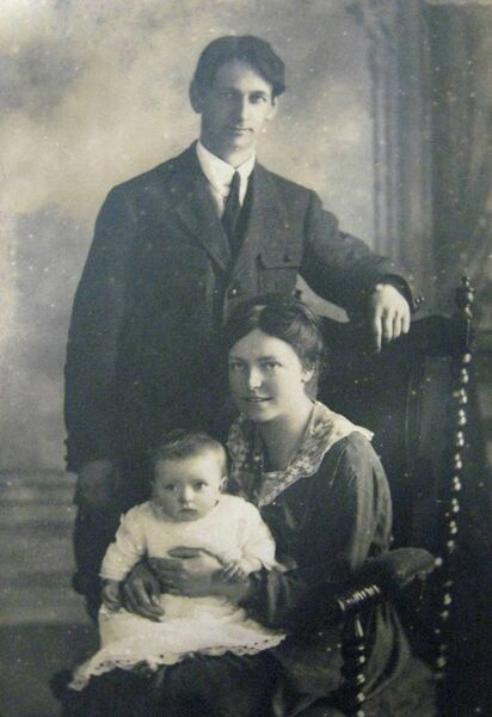
Over the years he had fought to keep the Corporation clear of all political questions and matters: “The motion brought forward today is not agreeable to my line of thought, though Isincerely hope for an honourablesolution to this desperate tangle, the Irish question.”
Cllr William F O’Connor, who had begun the evening as Lord Mayor,contributed to the debate by stating: ‘I would have to consider myself a Sinn Féiner if I subscribed to this motion. I am not prepared to consider myself a Sinn Féiner.”
A person in the public gallery shouted out, “We don’t want you”, and when O’Connor tried to continue his speech he was drowned out by a chorus of hissing.
After order was restored, O’Connor defiantly noted, “You gentlemen are out for the freedom of Ireland. I wish you God speed on your venture. I am also sure that the responsible leaders of your party will see to it that the minority here will get freedom of speech. I don’t see why, when I open my mouth, why I should be hissed if there is going to be toleration shown. When I was Lord Mayor, I allowed no member of the council be insulted and I am sure Lord Mayor MacCurtain will see to it that no man is denied the freedom of speech here.”
At the end of a lengthy debate with contributions by many councillors, the motion, pledging allegiance to Dáil Éireann, was put to a vote and passed by the Sinn Féin majority.
The winning margin was 30 votes to 11. At the conclusion of the meeting, Lord Mayor MacCurtain was presented with a Sinn Féin rosette by a member of the Cork Branch of Cumann na mBan. The new Lord Mayor then watched as the Sinn Féin flag was hoisted at high mast over City Hall.
As he celebrated with his family and friends, MacCurtain had no idea what the future would bring. Sacrifice had been a theme of his acceptance speech and, within a few short months, he would make theultimate sacrifice for his beliefs.
The composition of the new Cork Corporation was, however, notcomplete.
With William F O’Connor having won seats in three electoral wards, two by-elections were required. O’Connor was elected in the North West Electoral Area No. 1, the Central Area and the South Area No. 1. He chose to take his seat for the North West ward, thus creating vacancies in the other two.
A deadline of February 25 was set for nominations for the two by-elections.
For the Central Area, the two nominees were Sinn Féin’s Barry Michael Egan and the Independent, Jeremiah Lane. Lane had contested the elections on January 15, but did not win a seat.
He was unsuccessful too in the by-election, which took place on March 10 , and the vacant seat in the Central Area went to Barry Egan. There was only one nominee for the South Area No. 1 — Donal O’Callaghan of 58 Douglas Street. O’Callaghan, who had decided not to contest January’s Corporation elections, was now a member of the council, though he would have to wait until 11 March to be formally ratified.
The Sinn Féin majority in City Hall was strengthened to 32 members and the 28-year-old Donal O’Callaghan had taken his first tentative steps into the world of elected office.
A dramatic period of time lay ahead for the young man born in Factory Lane. Within nine months, he would be Lord Mayor of Cork.
RESULTS OF CORK CORPORATION ELECTIONS, JANUARY 15, 1920
North East Electoral Area (10 seats)
- Professor William Frederick Stockley,Alderman (Sinn Féin)— 186 Lower Glanmire Rd
- James Daly, Alderman (Irish Nationalist) —4 St Luke’s Place
- Anne Sutton (Sinn Féin) — Eagle Lodge,Summerhill
- Michael Joseph O’Riordan (Irish Nationalist) — 21, Wellington Rd
- John Scott (Commercial) — Wellington House, Lee Rd
- Seán O’Leary (Sinn Féin) — 3 Ashburton Hill
- Seán French (Sinn Féin) — 58 Patrick St
- Robert Day (Sinn Féin) — 9 Nicholas St
- Daniel Horgan (Irish Nationalist) —1 Rockgrove Terrace
- James Thomas Mulligan (Commercial) — Edenvale, Douglas Rd
North West Electoral Area No 1,Sunday’s Well (7 seats)
- Frederick J Murray, Alderman (Sinn Féin) —8 Sunday’s Well Rd
- Tadhg Barry, Alderman (Sinn Féin) —54 Blarney St
- Patrick Murphy (Irish Labour) — 49 Sunday’s Well Rd
- William F O’Connor (Irish Nationalist) —5 Highfield Avenue
- James Allen (Sinn Féin) — 5 Man’s Lane
- Thomas Daly (Sinn Féin) — 3 and 4 Kearney’s Lane
- Michael Joseph O’Callaghan (Independent) — 10 Cattlemarket St
North West Electoral Area No 2,Shandon (6 seats)
- Edmond Coughlan, Alderman (Sinn Féin) — 19 Pine St
- Patrick Higgins, Alderman (Sinn Féin) —70 Dominick St
- John F O’Sullivan (Irish Nationalist) — 45 Pope’s Quay
- Patrick F O’Sullivan (Irish Nationalist) — 12 Dominick St
- Simon Daly (Sinn Féin) — 25 John St
- Timothy O’Neill (Ex-Sailors and Soldiers) —3 St Patrick’s Square
North West Electoral Area No 3, Blackpool (6 seats)
- Tomás MacCurtain, Alderman (Sinn Féin) —40 Thomas Davis St
- Denis Lucey, Alderman (Sinn Féin) —32 Dublin St
- Gerald Byrne (Ex-Sailors and Soldiers) —45 Great William O’Brien St
- Michael O’Cuill (Sinn Féin) — 5 Red Abbey St
- Thomas Patrick Forde (Sinn Féin) — 17 StCatherine’s Place
- Michael Egan (Irish Labour)— 19 Commons Rd
Central Electoral Area (10 seats)
- James Joseph Walsh M.P., Alderman (Sinn Féin) — 10 Sullivan’s Quay
- Richard F Beamish, Alderman (Commercial) — Ashbourne, Glounthaune, Co Cork
- Daniel Gamble (Irish Nationalist) — 29 Grattan St
- Terence MacSwiney MP (Sinn Féin) —4 Belgrave Place
- Professor Alfred O’Rahilly (Sinn Féin) —University College Cork
- Thomas Stack (Irish Nationalist) — Maryville, Mardyke
- William Desmond (Commercial) — 2Pembroke St
- Jeremiah Kelleher (Irish Labour) —10 Gillabbey Terrace
- John Fitzpatrick (Sinn Féin) — 10 Greenmount Avenue
- William F O’Connor (Irish Nationalist) —5 Highfield Avenue
South Area No 1 (11 seats)
- Charles Coughlan, Alderman (Sinn Féin) — 137 Barrack’s St
- Seán O’Sullivan, Alderman (Sinn Féin) —16 Abbey St
- Seán Cronin (Irish Nationalist) — 28 StFinbarr’s Place
- Seán Good (Sinn Féin) — 54 Grand Parade
- John Horgan (Irish Nationalist) —9 St Nessan St
- Jeremiah Kelleher (Sinn Féin) — 58 Lough Rd
- Simon Mahony (Irish Nationalist) — 1 Tower St
- William F O’Connor (Irish Nationalist) —5 Highfield Avenue
- William Russell (Sinn Féin) — 68 Grand Parade
- John Sheehan (Sinn Féin) — 130 Evergreen Rd
- Maurice Walsh (Sinn Féin) — 1 French’s Quay
South Area No. 2 (6 seats)
- Liam de Róiste MP Alderman (Sinn Féin) —2 Upper Janemount
- Edward Fitzgerald, Alderman (Irish Nationalist) — Geraldine House, Albert Road
- Daniel Barry (Sinn Féin) — 57 HibernianBuildings
- Stephen J O’Riordan (Sinn Féin) — 16 High St
- John Desmond (Irish Nationalist) —Ballinlough Rd
- William Ellis (Irish Nationalist) — 13 Douglas St
This article was first published in the Irish Examiner on 26 January 2020
